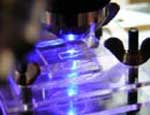 A research team at the University of London has announced a breakthrough in the oxidation of silicon, which could lead to significant energy savings in the most critical phase of semiconductor manufacturing.
A research team at the University of London has announced a breakthrough in the oxidation of silicon, which could lead to significant energy savings in the most critical phase of semiconductor manufacturing.
The oxidation of semiconductor silicon is foundational in chip fabrication. The silicon oxide layer serves as an insulator and protector for the semiconductor, retaining charge and controlling electrical circuits. The natural oxidation of silicon occurs very slowly, requiring microprocessor manufacturers to expend considerable energy using lasers to heat silicon wafers to temperatures as high as 1,000 degrees Celsius.
Instead of following traditional methods, electrical engineers have developed a way to use low-energy ultraviolet light to break down oxygen molecules on the surface of the material, thus accelerating the oxidation process.
“Our discovery could prompt the entire electronics industry to reevaluate its silicon processing methods,” said Professor Ian Boyd, who led the research. “Energy savings will reduce the production costs of consumer electronic devices, and of course, this will have positive environmental impacts.”
Ha Thao




















































